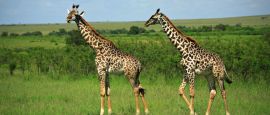Kenya Health Care and Vaccinations
| Title | Special precautions |
|---|---|
| Diphtheria |
Yes |
| Hepatitis A |
Yes |
| Malaria |
Sometimes** |
| Rabies |
Sometimes |
| Tetanus |
Sometimes |
| Typhoid |
Sometimes |
| Yellow Fever |
Yes* |
Healthcare in Kenya varies in quality depending on location, with the highest standards found in major cities and tourist centres. Nairobi and Mombasa have several well-equipped private hospitals and clinics offering a wide range of medical services, often with English-speaking doctors trained internationally. These facilities are generally the preferred option for visitors, as public hospitals can be overcrowded and may have limited resources.
Pharmacies are widespread in cities and towns and are usually easy to identify. Many operate long hours, and some are open late or 24 hours in larger urban areas. A range of medicines is available over the counter, including pain relief, cold remedies, and treatments for minor ailments. However, brand names and formulations may differ from those used at home, and availability can vary outside major centres.
Travellers who rely on prescription medication should bring an adequate supply for the duration of their stay, along with a copy of the prescription or a doctor's letter. This is particularly important for controlled or specialised medicines, which may not be readily available or may require additional documentation to purchase locally.
Travel insurance is strongly recommended, as private medical care can be expensive and payment is usually required upfront. Emergency medical services exist, but response times can be slow outside major cities. For serious illness or injury, evacuation to Nairobi or, in some cases, to another country may be necessary.
Tap water in Kenya is treated in major cities, but it is not generally recommended for visitors to drink. Bottled water is widely available and inexpensive, and it should be used for drinking and brushing teeth, particularly outside hotels and established accommodations. In some areas, water quality can be inconsistent, and using bottled or properly filtered water helps reduce the risk of stomach upsets.
Dairy products served in hotels, supermarkets, and reputable restaurants are usually pasteurised and safe to consume. Visitors should be cautious with unpasteurised milk or homemade dairy products, particularly in rural areas. Food hygiene standards in established eateries are generally good, but travellers are advised to eat freshly cooked food, avoid undercooked meat, and peel fruit themselves where possible. Choosing busy restaurants with high turnover is a reliable way to minimise health risks.
Health-related risks include heat exhaustion, dehydration, and mosquito-borne diseases in certain areas. Travellers should protect themselves from the sun, stay hydrated, and use insect repellent, particularly in low-lying regions. Wildlife-related incidents are rare but possible in national parks and rural areas, and visitors should always follow local guidance when on safari or near animals.
Crime is a common concern, particularly in large cities such as Nairobi and Mombasa. Petty theft, bag snatching, and pickpocketing can occur in busy areas, markets, and on public transport. Visitors are advised to avoid walking alone at night, keep valuables out of sight, and use taxis or ride-hailing services rather than public transport after dark.
Do you have any Feedback about this page?
© 2026 Columbus Travel Media Ltd. All rights reserved. No part of this site may be reproduced without our written permission, click here for information on Columbus Content Solutions.








 You know where
You know where